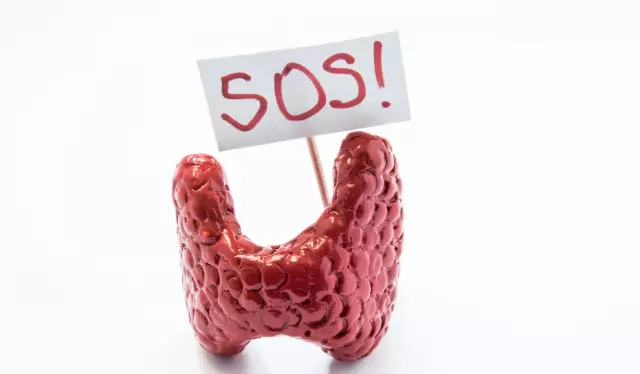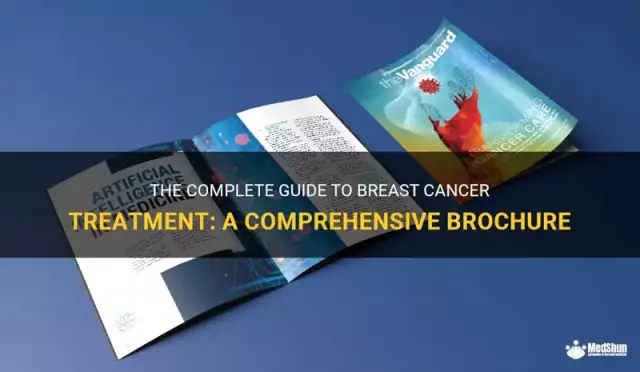- Author Rachel Wainwright wainwright@abchealthonline.com.
- Public 2023-12-15 07:39.
- Last modified 2025-11-02 20:14.
Thyroid cancer
General characteristics of the disease

Thyroid cancer is a serious endocrinological disease characterized by changes in the structure of thyroid cells and their pathological proliferation. The incidence of thyroid cancer in the world is relatively low - no more than 2% of all cases of cancer.
The most common symptoms of thyroid cancer are diagnosed in the elderly or in those who have been exposed to radiation. After the Ukrainian Chernobyl disaster, as well as the atomic bombings in Hiroshima and Nagasaki, signs of thyroid cancer were found in children who had undergone intrauterine irradiation. In all other cases, thyroid cancer, and even more metastases of thyroid cancer that have spread from another organ affected by the disease, is an extremely rare and not typical phenomenon for children.
In addition to radiation exposure, one of the causes of thyroid cancer is also called a chronic lack of iodine in the body. A great role in the development of thyroid cancer is various disorders of the immune-neuro-endocrine nature, manifested by the formation of goiter, benign tumors or cysts of the thyroid gland. The genetic family predisposition of patients is also considered to be a factor in thyroid cancer.
Thyroid Cancer Symptoms
Often, the first symptom of thyroid cancer is the discovery of a small lump on the organ, the so-called nodule. It is usually completely painless, and the size of the organ itself has not yet changed. With the progression of the disease and further growth of the tumor, a feeling of pressure in the area of the organ and an increase in neighboring lymph nodes are added to the symptoms of thyroid cancer.
Sometimes the development of the disease occurs against the background of additional signs of thyroid cancer, hypothyroidism (deficiency of thyroid hormones), or, conversely, moderate thyrotoxicosis (excess of thyroid hormones) joins the disease. With a large tumor and metastases of thyroid cancer in the trachea or esophagus, other signs of thyroid cancer are possible: shortness of breath, swallowing problems, hoarseness, etc.
Stages and forms of thyroid cancer
In about 90% of cases of diagnosed thyroid tumor, it turns out to be benign: papillary or follicular. The remaining 10% are anaplastic, medullary and mixed forms of thyroid cancer. Each of the forms is characterized by a predominant lesion of a certain type of thyroid cells, a different rate of development of the disease and a different number of malignant nodes. The most rare, no more than 1% of all cases of thyroid cancer, are metastases of thyroid cancer (they are also metastatic cancer).
Like other cancers, thyroid cancer is usually differentiated by stages depending on the degree of development of the disease. A sign of stage I thyroid cancer is the presence of a single tumor without metastases and deformation of the organ capsule. Symptoms of stage II thyroid cancer include the absence of metastases in the diagnosis of single or multiple malignant nodes and damage to the organ capsule.
Stage III thyroid cancer is characterized by damage to nearby lymph nodes, deformation of the thyroid gland itself and compression of adjacent tissues. Stage IV disease is called metastases of thyroid cancer, which has spread to distant lymph nodes and organs. The prognosis of thyroid cancer at stages I-II is the most favorable. The peak incidence of thyroid oncology occurs at the age of 30-50 years, when the disease is most amenable to treatment.
Diagnosis of thyroid cancer
Thyroid cancer is diagnosed in several stages. It begins with a simple palpation of an organ in the office of a therapist or endocrinologist and continues with more accurate and informative diagnostic methods. These include methods for imaging thyroid cancer, ultrasound and MRI, as well as the functional study of the organ using radioisotopes. The main method for determining the form of thyroid cancer is biochemical, the so-called biopsy of the internal tissues of the organ, taken with a thin biopsy needle.
Thyroid Cancer Treatment

The method of treatment for thyroid cancer is determined after diagnosing the form and stage of the disease. The best prognosis for thyroid cancer is demonstrated by surgical treatment of the disease with complete removal of the organ. After surgery, a patient with confirmed thyroid cancer symptoms is given lifelong hormone replacement therapy.
With a small tumor in the treatment of thyroid cancer, it is allowed to conduct an organ-preserving operation with partial removal of damaged organ tissues. In this case, the prognosis of thyroid cancer is significantly better with the use of complementary therapies, such as oral radioactive iodine therapy. It is considered to be an effective method of local organ radiation exposure. And a person undergoing such treatment for thyroid cancer does not pose a danger to others.
With advanced stages of the disease, the prognosis of thyroid cancer is better when a combination therapy is prescribed to the patient. It consists of total or partial removal of an organ, a course of radioactive iodine and chemotherapy. Every few weeks, the patient undergoes a control scan of the organ in order to monitor the dynamics of the treatment of thyroid cancer. With a low sensitivity of atypical cells to chemotherapy and radioactive iodine therapy, drug doses are increased.
The prognosis of thyroid cancer and statistics of patient survival are among the best among most cancers.
YouTube video related to the article:
The information is generalized and provided for informational purposes only. At the first sign of illness, see your doctor. Self-medication is hazardous to health!






